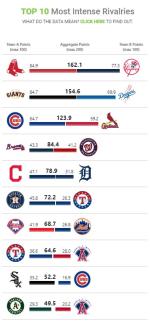Faculty Research: McCormack Department Launches Sport Rivalry Research Lab
April 14, 2021

A 2013 PhD graduate of that program, Tyler and fellow McCormack doctoral alum Joe Cobbs ’10 are cofounders of Know Rivalry, a pathbreaking research lab devoted to the subject. Their research database contains questionnaire responses from more than 30,000 fans so far, and they analyze the data to identify and measure rivalries. That includes gauging fan feelings and reactions toward rivals and justifying their “rival” status. The Know Rivalry Lab currently covers the lion’s share of high-profile, American professional and collegiate sports leagues and their teams, with data collection underway for a dozen more domestic and international leagues. (For the record: the Celtics’ top rival is the Lakers; the country’s top two NCAA football rivalries are Arizona versus Arizona State and Navy versus Army.)


Schadenfreude and bad behavior among rival fans, says Tyler, have made headlines most notoriously in European soccer, where nationalism can up the rivalry ante. (Rivalries, he emphasizes, differ from outright animosity in that rivalry involves a shared relationship.) How does the animosity within the competition between FC Barcelona and Real Madrid—known by fans as El Clasico—compare to the hostility of Red Sox fans toward the Yankees (see image right)? Stay tuned. Know Rivalry recently expanded their fan data collection to Europe, Asia, and Australia.
Tyler traces his academic interest in rivalries to a doctoral seminar at Isenberg. “I needed a quick definition of rivalry but discovered that one didn’t exist,” he recalls. “Research was conflicting. According to some, everyone in a sports division was a rival.” Cobbs’s interest in the subject dates to his days as a marketer in intercollegiate athletics at Miami University (Ohio), where he developed the program’s rivalry with Ohio University and the sobriquet, “Battle of the Bricks.”
Tyler’s move to McCormack in 2020 is bringing graduate and undergraduate students alike new opportunities to engage in research. That includes collecting, cleaning, and analyzing data from Know Rivalry’s expanding database. “There is also a significant interdisciplinary upside for pulling in other disciplines, including marketing, computer science, and psychology,” he remarks. “And we are expanding our database internationally. We have two dozen global leagues and partners all around the world.”
Rivalries are also good for business, Tyler emphasizes. “In marketing, an authentic rivalry narrative can fuel sponsorship investments and consumer engagement. A full-blown rivalry will bring fans added meaning and heightened involvement. And it can attract interest beyond a team’s fan base to a wider audience.”